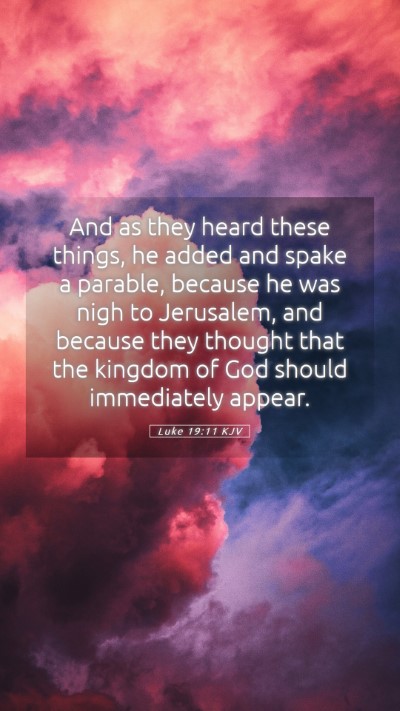Understanding Luke 19:11
In Luke 19:11, Jesus shares a parable to convey important lessons about the kingdom of God and the expectations of His followers. The verse reads:
"While they were listening to this, he went on to tell them a parable, because he was near Jerusalem and the people thought that the kingdom of God was going to appear at once." (Luke 19:11, NIV)
Bible Verse Explanations
This verse is pivotal for understanding the context in which Jesus discussed His kingdom. The crowd had expectations of an immediate establishment of God's kingdom with Jesus as its ruler. Here are key insights drawn from public domain commentaries:
- Matthew Henry: Henry emphasizes that the parable addresses the misconception of the Jews regarding the imminence of the Messiah’s reign. He highlights that Jesus is preparing His followers for a delayed fulfillment of prophecy.
- Albert Barnes: Barnes notes that the narrative arises from the expectation of the people. He explains the significance of the parable to illustrate the need for readiness and faithful stewardship in the light of Christ's eventual return.
- Adam Clarke: Clarke underscores the importance of understanding the 'kingdom of God' as both a present reality and a future hope. He suggests that the parable anticipates the delay of this kingdom's visible glory.
Meaning of the Parable
The parable that follows Luke 19:11 illustrates the principles of stewardship and accountability that God expects from His followers. Here’s a summary of its implications:
- Anticipation of Delay: Followers must recognize that while the kingdom will come, it may not be in the timeframe they expect.
- Faithful Service: Believers are called to diligently use the resources and talents entrusted to them, representing the gifts of God.
- Accountability: Just as the servants in the parable are held accountable for their actions, Christians will also face judgment regarding their faithfulness.
Historical Context
The audience in this narrative was primarily comprised of Jews who were anticipating a political Messianic deliverer. The context of Jerusalem being close adds weight to their expectations. The Roman oppression led many to seek an immediate resolution through divine intervention.
Applications of the Verse
Luke 19:11 serves as both encouragement and a warning to contemporary Christians:
- Readiness: Just as the original audience needed to leverage their understanding of Christ's kingdom, modern believers must prepare themselves for His return.
- Active Participation: We're called to take an active role in advancing the kingdom through service and stewardship, which can be embodied in everyday actions.
- Embracing the Journey: Recognizing that faith is often a journey—not merely an endpoint—encourages patience and perseverance amidst struggles.
Bible Cross References
This verse can be related to several other scriptures:
- Matthew 25:14-30 - The Parable of the Talents
- Mark 13:32-37 - The Watchful Servant
- Luke 12:42-48 - The Faithful and Wise Steward
Conclusion
Luke 19:11 centers on understanding the nature of God's kingdom, highlighting the tension between human expectation and divine timing. Through the insights from notable commentaries, we glean the importance of faithful service and preparation in our daily lives. This exploration contributes to a broader Bible verse commentary that aids in bible study insights and encourages deeper scripture analysis.
Engaging with this verse in individual or bible study groups can provide rich discussions that deepen understanding Scripture and apply its teachings practically.


